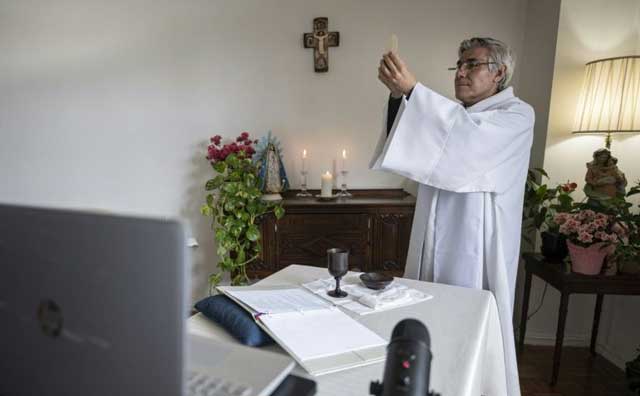
New York, United States | AFP | New York pastor Fabian Arias has been in constant mourning these past two months — the coronavirus has killed 44 of his mostly Hispanic parishioners, highlighting inequalities he says are being worsened by Donald Trump’s government.
Amid the tragedies, the Argentine priest is providing a lifeline to his devastated congregation: every week, he distributes food to more than 500 families affected by unemployment caused by lockdowns to slow the spread of COVID-19.
The situation at St Peter’s Lutheran Church in Manhattan shines a spotlight on how New York’s deadly virus outbreak has disproportionately affected America’s minority communities.
For 18 years, the 56-year-old Arias has been helping a community of around 400 Latin American immigrants, many of whom are undocumented and don’t have papers required to work in the US.
It is these immigrants, many of whom are considered essential workers and who continued to work as food delivery men or cleaners during the epidemic, who have been hit the hardest in New York City by COVID-19.
More Hispanics have died from the virus in the Big Apple than any other racial group: 6,072 of a total of more than 21,000 deaths, a heavier toll than the black community.
At a large warehouse in the Bronx borough, a dozen volunteers from Arias’s congregation prepare food parcels that are distributed four times a week to the corners of America’s financial capital.
Arias gives instructions in Spanish as the glove-wearing volunteers — themselves immigrants — place tomatoes, tortillas, jalapenos, potatoes and carrots into bags that are then loaded into cars.
“Our community has no way of paying rent or buying food,” says Arias, who since March has held live masses on Facebook from his home to thousands of worshippers — many more than who would normally attend his services.
Each time, he solemnly reads a long list of names of those killed by the disease caused by the new coronavirus.
“We don’t want people to be the living dead, we want them to be able to live in dignity,” says Arias, who has held about 20 funerals for virus victims, often at their homes when they can’t afford a funeral home.
Even his bishop, Paul Egensteiner, helps prepare the bags after leading the volunteers in prayer.
“Take away this virus from the face of the Earth,” he implores before the faithful, their heads down, gloved hands raised to the sky.
– ‘Vulnerable’ –
More than a million New Yorkers have lost their jobs since the city became the epicenter of America’s outbreak in late March.
One of the volunteer parishioners, Miguel Hernandez, lost his job at a restaurant.
“The situation is very difficult. The saddest thing is the children, who do not know what it is to not have a job. What they want is to eat,” the 41-year-old Mexican father-of-three told AFP.
Heidy Animas, 18, is out delivering the food — which is funded by private donations — with her father in East Harlem.
“We are helping those who are still alive, it is important because they do not have a job and are very vulnerable,” explains the student.
In front of his church in downtown Manhattan, Arias’s voice trembles as he denounces Trump’s clampdown on Hispanic immigrants.
“This is a community that for four years has been being excluded, mistreated, verbally attacked, with laws that instead of working for dignity, work for exclusion and separation,” he says.
Undocumented immigrants do not have health insurance and cannot claim benefits from the government, although millions of them pay taxes.
Many are so scared of being ejected from the country that they avoid going to hospital when they get ill.
Luis Varela Rojas, a 41-year-old undocumented worker who worked in a sewing factory and is now unemployed, knew seven friends and colleagues who died from the virus.
“There are many of us in need,” he says after receiving a bag of tortillas and eggs in the Bronx.
 The Independent Uganda: You get the Truth we Pay the Price
The Independent Uganda: You get the Truth we Pay the Price





